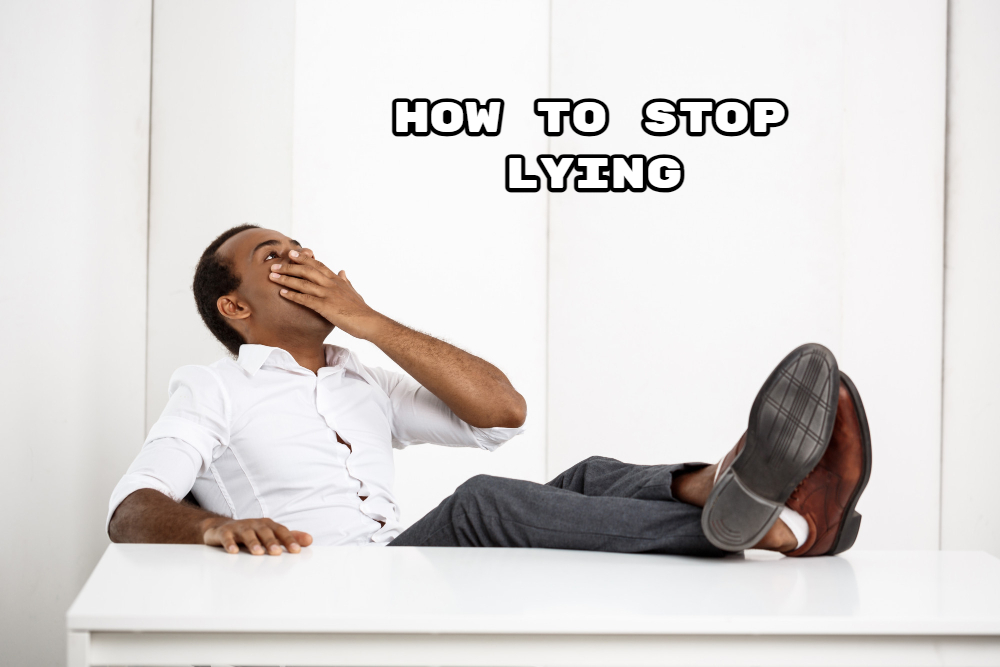We all tell lies at some point, whether small white lies or more significant fabrications. However, continual dishonesty can have severe consequences, damaging relationships and eroding trust. The good news is that stopping lying is possible with the right mindset and actions. This article will explore the signs of a lying problem, the reasons behind dishonesty, and practical steps to break free from the habit.
Signs of a Lying Problem
1. Unjustifiable Lies
If you find yourself telling lies without a valid reason, it’s a clear sign that your honesty might be slipping away.
2. Excusing Lies
Justifying lies as necessary to protect others from the truth is a red flag. Honesty is the cornerstone of healthy communication.
3. Fabricating Stories
Creating elaborate stories to hide the truth suggests a deeper issue. Understanding why you feel the need to do this is crucial.
4. External Feedback
When others start pointing out your lies or expressing mistrust, it’s time for self-reflection.
5. Loss of Trust
If your close relationships suffer and people no longer trust your words, lying might be at the root of the problem.
6. Identity Crisis
Feeling like no one knows the real you is a common outcome of chronic dishonesty.
7. Serious Consequences
When lies lead to significant repercussions, such as the loss of relationships or opportunities, it’s a wake-up call.
How to Stop Lying
1. Stop Justifying Dishonesty
Lying is a common human behaviour, with most individuals being generally truthful in their day-to-day communication. While it’s challenging to pinpoint the exact frequency of lies, if you find yourself surpassing the average lie count per day, it’s crucial to acknowledge the issue. Recognizing the problem is the initial step towards lasting change.
2. Understand Why You Lie
To foster more honesty in your communication, delve into the types of lies you’re telling and the motivations behind them. People typically lie about their opinions, actions, achievements, explanations for behaviours, and personal possessions. Understanding why you lie can aid in curbing this behaviour.
3. Consider the Consequences
Not all lies are created equal. While some may aim to protect self-esteem or spare feelings, others may exploit or manipulate. Assess the impact of your lies on yourself and others. Even seemingly well-intentioned lies can have consequences, and discerning the difference is crucial.
4. Put Your Relationships First
Lies can inflict lasting damage on relationships. Even seemingly harmless fibs can erode trust, making it challenging to rebuild. Consider the impact on your connections when tempted to tell a lie. Prioritizing honesty strengthens your bonds with friends, family, and romantic partners.
5. Remember That Lies Create Stress
While a lie might offer a quick fix, the stress of maintaining it can lead to long-term problems. Consider the toll on your mental well-being.
6. Practice Being Authentic
People often lie out of fear of rejection. You allow others to know the real you by revealing your true feelings and thoughts. Maintaining a facade to preserve relationships becomes unnecessary when you embrace honesty and vulnerability.
7. Consider How Others Feel
Despite self-perceived lie-detection skills, people are generally poor at detecting deception. However, discovering a lie can result in feelings of betrayal, hurt, and manipulation. Consider the impact on others and practice empathy before choosing to lie.
8. Find Alternatives to Lying
Identify situations where lying is tempting and brainstorm alternative coping mechanisms. Starting small, being kind and tactful, writing down your thoughts, not oversharing, and changing the subject are effective alternatives to resorting to lies.
9. Change the Subject
Changing a habit takes time, so devise a plan to overcome the tendency to lie. Map out steps to gradually introduce more truthfulness into your communication and relationships.
10. Talk to a Professional
If lying feels impulsive or uncontrollable, consider consulting a mental health professional. Therapy can help uncover underlying reasons for dishonesty, provide coping strategies, and mend relationships impacted by lies.
Conclusion
Stopping the habit of lying requires self-reflection, understanding the motives behind dishonesty, and a commitment to building honest relationships. Remember, the benefits of honesty extend beyond personal growth; they contribute to stronger, more trusting connections with those around you.
Frequently Asked Questions
- Can everyone detect lies accurately?
- While people claim to be good at spotting lies, studies show they’re accurate only about 54% of the time. Deception can go unnoticed, but its discovery can still impact relationships.
- Is it ever okay to lie?
- Certain situations may warrant withholding the truth, but even well-intentioned lies can have consequences. Consider the potential impact on others before choosing to lie.
- How can I be honest without hurting someone’s feelings?
- Choose kindness and tact. Gently share your opinions, focusing on prosocial relationships. Remember, honest feedback doesn’t have to be brutal.
- What if I find it hard to share the truth verbally?
- Writing your thoughts in a letter, email, or text can be an alternative. It allows you to communicate honestly without the challenge of speaking out loud.
- When should I seek professional help to stop lying?
- If lying negatively impacts your life or relationships, consult a mental health professional. They can help explore underlying issues and provide strategies for change.
